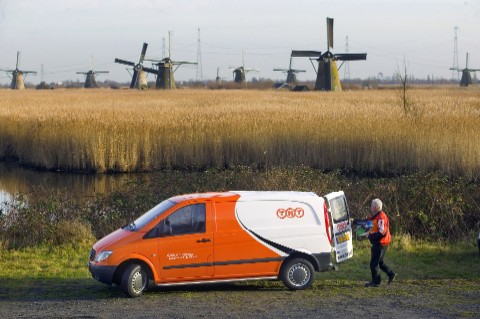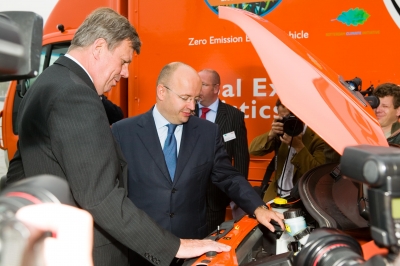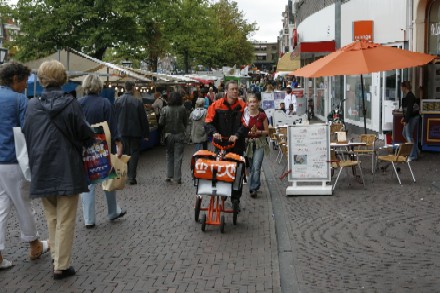Navigation
Mail and Express Delivery Company TNT Launches Comprehensive Program To Cut CO2 Emissions: Company Calls On Employees To Extend Initiative Into Their Private Lives
On 30 August 2007, TNT’s Chief executive officer Peter Bakker launched TNT’s strategy to improve transparency on the company’s carbon footprint, to drastically reduce CO2 emiissions from the company’s operations and to stimulate its 159,000 employees to do the same in their private lives.
 |
| Zero emission electric truck |
On 30 August 2007, TNT’s Chief executive officer Peter Bakker launched TNT’s strategy to improve transparency on the company’s carbon footprint, to drastically reduce CO2 emiissions from the company’s operations and to stimulate its 159,000 employees to do the same in their private lives. TNT’s program is called “Planet Me”.
Firstly, TNT is installing a certified system to measure, report and manage its CO2 emissions.
Secondly, the company is implementing CO2 reduction initiatives in its eight most important operational areas: aviation, buildings, business travel, company cars, partnering with customers, operational fleet, procurement, and investments.
Thirdly, the program stimulates employees to use less energy at home and on the road.
“There is a strong business case for Planet Me. Customers, governments, our employees and also the general publics increasingly look at how companies respond to global warming," said Mr. Bakker.
 |
| CEO of TNT Peter Bak |
"As a leader in our industry we feel a responsibility to pro-actively address this”, Mr. Bakker said. “For TNT the challenge of reducing CO2 emissions is tremendous."
"Low-carbon technologies for transport are just not available or too costly to implement. Despite these challenges this announcement is the start of our quest to become the first zero emissions express and mail company in the world”.
 |
| Zero emission electric truck |
Prior to the announcement of the PlanetMe, on August 21, 2007, Ivo Opstelten (Mayor of Rotterdam and Chairman of the Rotterdam Climate Initiative) and Peter Bakker (CEO of TNT) presented the two Smith electrical trucks which will be piloted in the Rotterdam area as part of the Rotterdam Climate Initiative.
The vehicles, a 3.5-tonne Smith Edison EV and a 9-tonne Smith Newton EV, will operate emission free in congested areas. The pilot is a significant step to contribute to the objective to reduce CO2 emissions by half in Rotterdam by 2025 compared to 1990.
"This is an excellent example of how innovative entrepreneurship combines environmental profit with economic profit." according to Mayor Opstelten. "The Rotterdam Climate Initiative offers support to this type of pilots and a platform to test their business cases. We are proud that TNT chose to team up with us and welcome them as our latest business partner."
"Next to raising the necessary awareness and involving stakeholders to address the problems the earth is currently facing, we are both committed to actually undertake action."
Mr. Bakker said: "We are very aware of the impact of our operations on the environment and recognise that we contribute to the problem of climate change. Hence, we feel it‘s our responsibility to contribute to a viable long-term solution."
 |
"Protecting the environment also makes business sense, as our stakeholders are increasingly evaluating us on our environmental impact. TNT foresees electric vehicles to become a key component for future super-urbanized inner city pick up and delivery networks as more and more restrictions are imposed on emissions in urbanized areas."
 |
| TNT Headquarte in the Netherlands |
TNT said the company recognizes its social responsibility in other ways as well. It has formed partnerships with the United Nations World Food Programme and the United Nations Environment Programme to fight hunger and pollution in the world.
TNT is responsible for the contents of this article.
Search
Latest articles
Agriculture
- World Water Week: Healthy ecosystems essential to human health: from coronavirus to malnutrition Online session Wednesday 24 August 17:00-18:20
- World Water Week: Healthy ecosystems essential to human health: from coronavirus to malnutrition Online session Wednesday 24 August 17:00-18:20
Air Pollution
- "Water and Sanitation-Related Diseases and the Changing Environment: Challenges, Interventions, and Preventive Measures" Volume 2 Is Now Available
- Global Innovation Exchange Co-Created by Horizon International, USAID, Bill and Melinda Gates Foundation and Others
Biodiversity
- It is time for international mobilization against climate change
- World Water Week: Healthy ecosystems essential to human health: from coronavirus to malnutrition Online session Wednesday 24 August 17:00-18:20
Desertification
- World Water Week: Healthy ecosystems essential to human health: from coronavirus to malnutrition Online session Wednesday 24 August 17:00-18:20
- UN Food Systems Summit Receives Over 1,200 Ideas to Help Meet Sustainable Development Goals
Endangered Species
- Mangrove Action Project Collaborates to Restore and Preserve Mangrove Ecosystems
- Coral Research in Palau offers a “Glimmer of Hope”
Energy
- Global Innovation Exchange Co-Created by Horizon International, USAID, Bill and Melinda Gates Foundation and Others
- Wildlife Preservation in Southeast Nova Scotia
Exhibits
- Global Innovation Exchange Co-Created by Horizon International, USAID, Bill and Melinda Gates Foundation and Others
- Coral Reefs
Forests
- NASA Satellites Reveal Major Shifts in Global Freshwater Updated June 2020
- Global Innovation Exchange Co-Created by Horizon International, USAID, Bill and Melinda Gates Foundation and Others
Global Climate Change
- It is time for international mobilization against climate change
- It is time for international mobilization against climate change
Global Health
- World Water Week: Healthy ecosystems essential to human health: from coronavirus to malnutrition Online session Wednesday 24 August 17:00-18:20
- More than 400 schoolgirls, family and teachers rescued from Afghanistan by small coalition
Industry
- "Water and Sanitation-Related Diseases and the Changing Environment: Challenges, Interventions, and Preventive Measures" Volume 2 Is Now Available
- Global Innovation Exchange Co-Created by Horizon International, USAID, Bill and Melinda Gates Foundation and Others
Natural Disaster Relief
- STOP ATTACKS ON HEALTH CARE IN UKRAINE
- Global Innovation Exchange Co-Created by Horizon International, USAID, Bill and Melinda Gates Foundation and Others
News and Special Reports
- World Water Week: Healthy ecosystems essential to human health: from coronavirus to malnutrition Online session Wednesday 24 August 17:00-18:20
- STOP ATTACKS ON HEALTH CARE IN UKRAINE
Oceans, Coral Reefs
- World Water Week: Healthy ecosystems essential to human health: from coronavirus to malnutrition Online session Wednesday 24 August 17:00-18:20
- Mangrove Action Project Collaborates to Restore and Preserve Mangrove Ecosystems
Pollution
- Zakaria Ouedraogo of Burkina Faso Produces Film “Nzoue Fiyen: Water Not Drinkable”
- "Water and Sanitation-Related Diseases and the Changing Environment: Challenges, Interventions, and Preventive Measures" Volume 2 Is Now Available
Population
- "Water and Sanitation-Related Diseases and the Changing Environment: Challenges, Interventions, and Preventive Measures" Volume 2 Is Now Available
- "Water and Sanitation-Related Diseases and the Changing Environment: Challenges, Interventions, and Preventive Measures" Volume 2 Is Now Available
Public Health
- Honouring the visionary behind India’s sanitation revolution
- Honouring the visionary behind India’s sanitation revolution
Rivers
- World Water Week: Healthy ecosystems essential to human health: from coronavirus to malnutrition Online session Wednesday 24 August 17:00-18:20
- Mangrove Action Project Collaborates to Restore and Preserve Mangrove Ecosystems
Sanitation
- Honouring the visionary behind India’s sanitation revolution
- Honouring the visionary behind India’s sanitation revolution
Toxic Chemicals
- "Water and Sanitation-Related Diseases and the Changing Environment: Challenges, Interventions, and Preventive Measures" Volume 2 Is Now Available
- Actions to Prevent Polluted Drinking Water in the United States
Transportation
- "Water and Sanitation-Related Diseases and the Changing Environment: Challenges, Interventions, and Preventive Measures" Volume 2 Is Now Available
- Urbanization Provides Opportunities for Transition to a Green Economy, Says New Report
Waste Management
- Honouring the visionary behind India’s sanitation revolution
- Honouring the visionary behind India’s sanitation revolution
Water
- Honouring the visionary behind India’s sanitation revolution
- Honouring the visionary behind India’s sanitation revolution
Water and Sanitation
- Honouring the visionary behind India’s sanitation revolution
- Honouring the visionary behind India’s sanitation revolution

